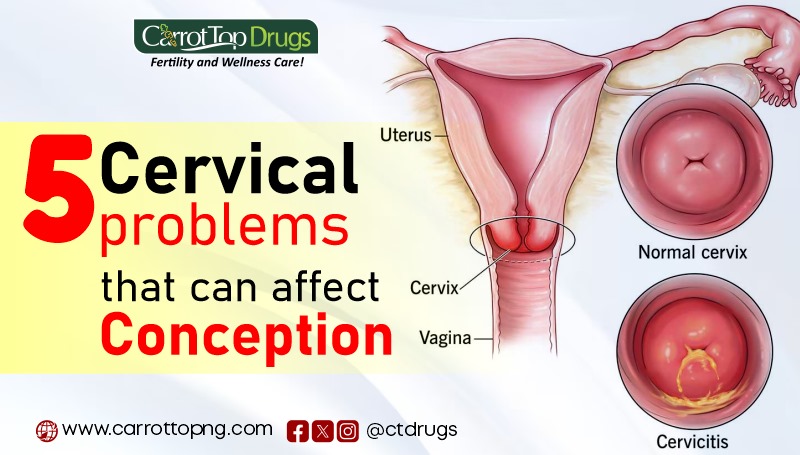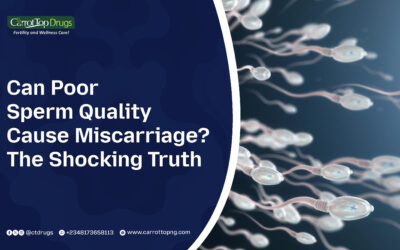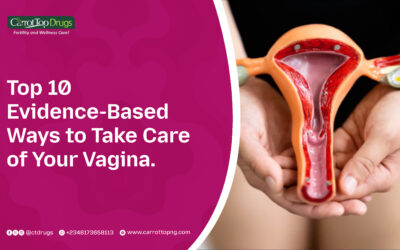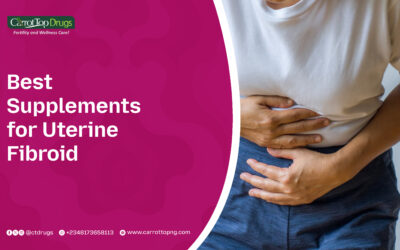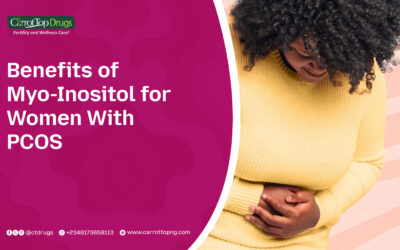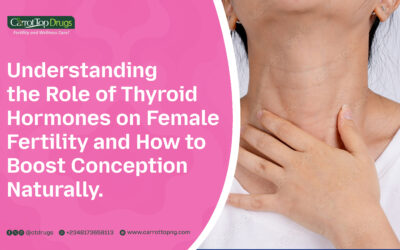Introduction
Cervical problems can significantly impact a woman’s ability to conceive. From cervical stenosis to cervical mucus abnormalities and infections, these issues pose challenges for individuals striving to achieve pregnancy. In this article, we would examine some cervical problems that can affect conception and how to deal with them. Understanding the prevalence, causes, and effects of cervical problems on conception is essential for effective diagnosis and management, ultimately supporting women in their reproductive journey.
Role of the Cervix in Conception
- Facilitates Sperm Passage: The cervix, located at the lower part of the uterus, acts as a gateway for sperm to travel from the vagina into the uterus and fallopian tubes. It provides a channel through which sperm can reach the site of fertilization.
- Protective Barrier: The cervix serves as a barrier, preventing pathogens and harmful substances from entering the reproductive tract. It acts as a physical barrier to safeguard fertility and protect the developing embryo during pregnancy.
- Production of Cervical Mucus: Glands within the cervix produce cervical mucus, which undergoes changes throughout the menstrual cycle. During ovulation, cervical mucus becomes more abundant, thin, and stretchy, facilitating sperm transport and survival.
- Enhanced Sperm Viability: The transformation of cervical mucus during ovulation enhances sperm viability and motility. The thin, stretchy consistency of cervical mucus allows sperm to move more freely through the cervix, increasing the likelihood of fertilization.
- Medium for Sperm Selection: Cervical mucus serves as a medium for sperm selection. Certain characteristics of cervical mucus influence sperm survival and capacitation, ensuring that only the most robust and viable sperm reach the fallopian tubes for fertilization.
Common Cervical Problems Affecting Conception
Cervical Stenosis:
One of the common cervical problems that can affect conception is cervical stenosis. Cervical stenosis refers to a narrowing or obstruction of the cervical canal, which can impede the passage of sperm into the uterus. This condition may be congenital or acquired, resulting from scarring or inflammation of the cervical tissue. Cervical stenosis can interfere with natural conception and may require medical intervention, such as cervical dilation, to facilitate sperm entry.
Cervical Mucus Abnormalities:
Aside from cervical stenosis, another one of the cervical problems that can affect conception is abnormalities with the cervical mucus. Abnormalities in cervical mucus production or consistency can affect sperm transport and viability. Insufficient or hostile cervical mucus may hinder sperm movement, making it difficult for sperm to reach the fallopian tubes and fertilize the egg. Factors such as hormonal imbalances, medication use, and cervical infections can contribute to alterations in cervical mucus quality, impacting fertility.
Cervical Infections:
Infections of the cervix, such as sexually transmitted infections (STIs) or bacterial vaginosis, can disrupt cervical health and function, potentially affecting conception. Infections may cause inflammation, cervical discharge, and structural damage, leading to decreased sperm viability and motility. Timely diagnosis and treatment of cervical infections are crucial for preserving fertility and reproductive health.
Cervical Polyps:
Cervical polyps are benign growths that can develop on the surface of the cervix. It is one of the cervical problems that can affect conception. While often asymptomatic, larger polyps may cause abnormal vaginal bleeding or interfere with sperm migration through the cervical canal. In some cases, cervical polyps may need to be removed surgically to alleviate symptoms and optimize fertility.
Cervical Incompetence:
Cervical incompetence is also called cervical insufficiency. It can be caused by physical injury to the cervix during a difficult childbirth or in some cases, during an abortion procedure done using a procedure called D&C (Dilation and Curettage). Cervical incompetence can lead to late miscarriage or preterm birth.
Effects of Cervical Problems on Conception
Cervical problems can impair various aspects of the conception process, leading to difficulties in achieving pregnancy. Factors such as reduced sperm transport, impaired sperm function, and increased susceptibility to infections can decrease fertility rates and prolong the time to conception for affected individuals.
Reduced Sperm Transport:
Cervical stenosis or mucus abnormalities can hinder the passage of sperm through the cervix, limiting their access to the upper reproductive tract and reducing the likelihood of fertilization. This can result in decreased sperm motility and viability, compromising the chances of successful conception.
Impaired Sperm Function:
Abnormal cervical conditions may expose sperm to hostile environments or pathogens, compromising their function and fertilization potential. Infections or inflammatory processes can damage sperm cells, impairing their ability to penetrate the egg and initiate embryo development.
Increased Risk of Infections:
Cervical infections not only affect cervical health but also pose risks to overall reproductive health and pregnancy outcomes. Infections such as chlamydia or gonorrhea can ascend from the cervix to the uterus and fallopian tubes, causing pelvic inflammatory disease (PID) and potentially leading to tubal damage or infertility. Moreover, cervical infections during pregnancy can increase the risk of adverse outcomes, including preterm birth and neonatal infections.
Possible Solutions to Cervical Problems Affecting Conception
Medical Interventions
Cervical Dilation:
For individuals with cervical stenosis, a medical procedure called cervical dilation may be necessary to widen the cervical canal, allowing for improved sperm passage and fertility. Cervical dilation can be performed manually in a clinical setting or through minimally invasive techniques such as hysteroscopy. This procedure aims to alleviate obstruction and enhance the chances of successful conception.
Polyp Removal:
In cases where cervical polyps are present and contributing to fertility issues, surgical removal may be recommended. Polypectomy, a minimally invasive procedure, involves the removal of cervical polyps using specialized instruments inserted through the cervix. By eliminating obstructive growths, polyp removal can restore normal cervical function and improve fertility outcomes for affected individuals.
Treatment of Infections:
Timely diagnosis and treatment of cervical infections are essential for preserving cervical health and optimizing fertility. Depending on the type and severity of the infection, treatment may involve antibiotics, antifungal medications, or antiviral agents to eradicate pathogens and alleviate inflammation. Additionally, addressing underlying risk factors such as unprotected sexual activity or compromised immune function is important for preventing recurrent infections and promoting reproductive health.
Hormonal Therapy:
In cases where hormonal imbalances contribute to cervical mucus abnormalities, hormonal therapy may be prescribed to regulate menstrual cycles and optimize cervical mucus quality. Hormonal medications such as clomiphene citrate or letrozole can stimulate ovulation and promote the production of fertile cervical mucus, enhancing the likelihood of successful conception. Hormonal therapy is often used in conjunction with fertility monitoring and assisted reproductive techniques to maximize fertility outcomes.
Lifestyle Modifications
Maintaining a Healthy Weight:
Maintaining a healthy weight through balanced nutrition and regular exercise is important for optimizing cervical health and fertility. Obesity has been associated with hormonal imbalances, insulin resistance, and inflammation, all of which can negatively impact cervical function and fertility. Conversely, achieving a healthy weight can improve hormonal balance, menstrual regularity, and reproductive outcomes for individuals struggling with fertility due to cervical issues.
Avoiding Harmful Substances:
Avoiding substances such as tobacco, alcohol, and recreational drugs is crucial for preserving cervical health and optimizing fertility. These substances can impair cervical function, disrupt hormonal balance, and increase the risk of cervical infections, all of which can interfere with conception. By abstaining from harmful substances, individuals can protect their cervical health and improve their chances of achieving pregnancy.
Stress Management:
Stress can negatively impact fertility by affecting hormonal balance, menstrual cycles, and overall reproductive function. Practicing stress-reducing techniques such as mindfulness, meditation, yoga, or therapy can help individuals cope with the emotional challenges of fertility struggles and promote relaxation and well-being. By managing stress effectively, individuals can support their cervical health and enhance their fertility potential.
Supplement
Another way to tackle the common cervical problems that can affect conception is through the use of supplements. These supplements contain the right nutrients that helps to keep the cervix healthy. Nutrients like Vitamin C, Calcium, L-arginine, etc. These nutrients are found in our supplement: Evergreen CM. It serves as a fertility adjuvant that increases cervical secretions, helps to maintain vaginal pH, provide antioxidant support for sperm and improve libido in women.
Conclusion
In conclusion, cervical problems can significantly impact a woman’s ability to conceive by interfering with sperm transport, function, and cervical health. Understanding the prevalence, causes, and effects of cervical issues on conception is essential for providing targeted interventions and support to individuals facing fertility challenges. Early detection, appropriate management, and comprehensive care are key to optimizing fertility outcomes and helping individuals achieve their reproductive goals.
FAQs
Q: What are cervical problems affecting conception?
A: Cervical problems include conditions like stenosis, mucus abnormalities, infections, and polyps, which hinder sperm transport and affect fertility.
Q: What medical interventions are available for cervical problems?
A: Medical interventions include cervical dilation, polyp removal, treating infections, and hormonal therapy to regulate mucus quality.
Q: How can lifestyle modifications help?
A: Maintaining a healthy weight, avoiding harmful substances, and stress management can support cervical health and fertility.
Q: What is cervical dilation?
A: It’s a procedure widening the cervical canal, recommended for stenosis to enhance sperm passage and fertility.
Q: What are cervical polyps?
A: Benign growths on the cervix, they may require removal (polypectomy) if interfering with fertility.
Q: How does stress management help fertility?
A: Techniques like mindfulness or yoga reduce stress, supporting cervical health and fertility.

